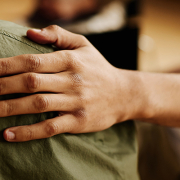A Grounded Leader or a Grounded Manager?
I was seated at a local coffee shop having ordered my extra hot almond latte enjoying an unusually warm and still early spring morning, indulging in one of my favourite informal mindfulness activity – people watching. And without intending to eavesdrop, I could not help but tune into the conversation at the adjoining table.
One of the patrons was discussing how they felt like the coffee in the machine, being crushed and ground into the dust, having their very essence sucked out due to competing priorities, constant changes in the workplace and challenging team dynamics. I could relate to the ensuing dialogue at the adjoining table, from my previous work place culture and job demands… and the journey that helped me distinguish between “Being Grounded” and being ground.
So, what is the difference you might ask? The difference really is in our internal experience
‘Grounding Techniques’ is one of the skills that is taught to overcome acute experiences of anxiety, using our sensory organs to connect with our immediate environment. Through regular practice, we learn the skill to gain control and connection with our external environment, forging a link between the mind and the body. This crucial skill helps regulate our internal environment and be responsive to the demands that are placed on us. The end result is we navigate our world mindfully, deliberately in an unpressured and responsive way. We become active listeners, collaborative problem solvers and engaged leaders.
In contrast, when we lose the connection between the mind and the body, disregarding the physiological feedback, we navigate the world in an autopilot mode. We push through the challenges that we face in a reactive and pressured manner and embrace the risk of erosion of resilience. Consequently, we often feel tired, irritable and volatile, because we have allowed ourselves to be ground to the earth. Is it any wonder that we are often disengaged with people around us when we are internally disengaged with ourselves’?
Incorporating a few everyday mindfulness micro moments is an empowering practice, particularly to those who may have the responsibility to support others in their personal and professional lives.
Below are a few techniques
- Mindful Morning Routine – Actively engage your sensory organs – while making the first cup of tea or coffee – noticing the colour of the brew, the fragrance, the temperature, the sensations in your mouth in anticipation of that first sip and the noise around you.
- Mindful Commuting – If you are driving in and stuck in traffic – embrace the joy of just being in your car – after all you spent considerable time, money and energy buying it… so savour your purchase with gratitude. If you are taking public transport – choose a theme – spot the birds or the trees, find the rhythm in the sounds around you and acknowledge with gratitude the effort of the driver that is taking you places.
- Mindfulness at Work – Embrace ‘Single Tasking’ and remind yourself that multitasking is a myth…and remind yourself that unless you are in ‘life saving’ job nothing that you do is ‘that’ Take short breaks away from your desk and devices… go to the kitchen or foyer and smile and greet your co-workers… if working from home… step outside and stretch your body
- Mindful Eating – Eat when you are hungry and ‘sensationally’ using your senses and without distractions… in a space that is devoid of devices.
- Mindfulness with People – Focus on the person in front of you with a curiosity mindset, become aware of your pre-emptive responses and judgements and your urge to come to a solution or agreement– practice paraphrasing, clarifying and affirming.
- Cultivating patience – Recognise internal states of becoming edgy, irritable and pressured – practice deep breathing and if necessary take a short break, sip water deliberately and slowly
- Mindful Exercise – Incorporate breath guided movement into your physical activity – swimming or yoga
- Embrace Creative pursuits – play an instrument, listen to music, enrol in welding, blacksmithing, lead lighting
Being a Grounded Leader essentially requires that you are self-aware and moderate your own mental, emotional and physical responses before you can be available to help someone else…
The information provided in this document is general in nature and is intended to be used for information purposes only. While we have tried to ensure the accuracy of the information published, no guarantee can be given that the information is free from error or omission or that it is accurate, current or complete.
The information published is not, and should not be relied on as, health or treatment advice. The diagnosis and treatment of any mental illness requires the attention of a physician or other properly qualified mental health professional. If you are seeking diagnosis or treatment of any other mental illness, you should consult a physician or mental health professional. You should not delay in seeking, or disregard, professional health advice because of something you have read in this document.









